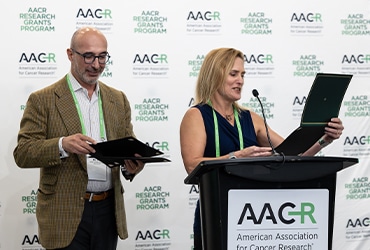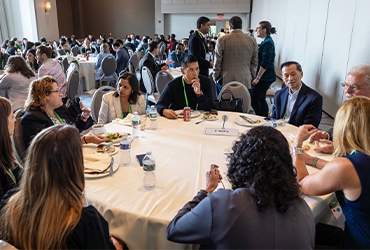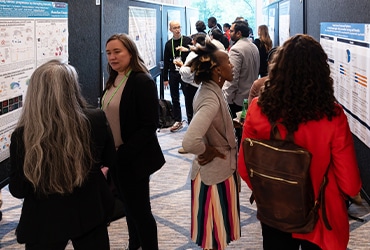The Inaugural AACR Grantee Summit Shines the Spotlight on Emerging Researchers
On October 7, 2024, the American Association for Cancer Research (AACR) kicked off its inaugural Grantee Summit, which aimed to support the training of current AACR grant recipients through scientific, networking, and career development sessions. The Summit, held in Philadelphia, welcomed grantees from across the country and and around the world for engaging sessions centered around the event’s theme, “Igniting Innovation in Cancer Research.” The event brought AACR grantees together with distinguished invited speakers, funding partners, and AACR staff to participate in a program tailored to bolster the careers of AACR grantees.

The Summit was co-chaired by Manuel Hidalgo, MD, PhD, and Sheila Stewart, PhD. Dr. Hidalgo is the Chief of the Division of Hematology and Medical Oncology at Weil Cornell Medicine/New York-Presbyterian Hospital, and Dr. Stewart is the Gerty Cori Professor and Vice Chair in the Department of Cell Biology and Physiology at Washington University in St. Louis. In their keynote addresses, Drs. Hidalgo and Stewart shared unique perspectives from their careers as a physician-scientist and a basic scientist, respectively. A key takeaway for early career investigators, regardless of scientific discipline, was the importance of building a strong network to advance both their science and their careers.
The scientific sessions contained a rich breadth of topics relevant to early career investigators. Select AACR grantees gave oral presentations across four sessions, ranging from elegant mechanistic studies to the development of a mobile app for breast cancer screening in Ghana. These presentations highlighted work supported by the AACR and its funding partners and sparked discussions on future steps, collaborations, and alternative approaches.

The road to developing a successful therapeutic is a long one. Jeffrey Engelman, MD, PhD, co-founder and Chief Scientific Officer of Treeline Biosciences, shared insights on the characteristics of a successful therapeutic, encouraging attendees to generate robust data as the foundation for effective drug development.
Many of the initial discoveries in drug development happen in academic laboratories, with the hopes of eventually developing a therapeutic to treat patients. Unfortunately, many researchers do not have the opportunity to hear the patient’s perspective. To bridge this gap, the Summit featured a panel session that included Kris Graham, a patient advocate, who shared insights from her personal experience with a cancer diagnosis and treatment. Ms. Graham emphasized the value of healthcare providers taking the time to educate patients on their diagnosis, noting that this can empower patients in managing their health and may encourage participation in clinical trials. Additionally, Philadelphia sports broadcaster and cancer survivor John Kincade expressed his gratitude to the grantees, thanking them for conducting life-saving research and encouraging them to remember the far-reaching impact of their work for cancer patients, even when they may not have direct patient interactions.
Another unique aspect of the Summit was to hear first-hand career stories from prominent leaders in cancer research. In a fireside chat with AACR Chief Philanthropic Officer Mitch Stoller, Lillian Siu, MD shared insights into her career path, touching on experiences that have influenced her professional growth into her roles as AACR President-elect, director of the Phase I Clinical Trials Program, codirector of the Robert and Maggie Bras and Family Drug Development Program, clinical lead for the Tumor Immunotherapy Program, and the BMO Chair in Precision Cancer Genomics at the Princess Margaret Cancer Centre, University Health Network in Toronto, Canada. The conversation covered numerous aspects of Dr. Siu’s professional growth, touching on her achievements and the challenges she has overcome, along with her vision for her AACR presidency. Dr. Siu emphasized the importance of mentors in shaping her career, noting that she intends to make mentorship a cornerstone of her AACR presidential initiatives. She also spoke on topics such as exploring areas beyond one’s expertise and maintaining a work-life balance, the latter of which she acknowledged she is still navigating. Her candid responses inspired meaningful questions from early-career investigators in the audience, including her advice on overcoming imposter syndrome.

In addition to hearing anecdotal insights and advice from invited speakers, grantees had the opportunity to ask further questions during roundtable discussions focused on topics aligned with their career development interests. These topics ranged from publication and grant writing tips to equally essential, non-technical areas like managing an independent laboratory or building a professional network. The roundtables provided a valuable platform for networking, with leaders like Drs. Hidalgo, Siu, and Stewart moderating small groups of ten participants each. This intimate setting, enjoyed over lunch, facilitated personal connections and enabled grantees to expand their networks with both peers and prominent figures in cancer research.
The evening poster session, featuring over thirty posters, was another opportunity for grantees to network with colleagues, funders, and AACR staff. Industry and foundation funding partners, as well as AACR staff across numerous departments, were in attendance for the engaging poster session. Jenny Hogstrom, PhD, Ryan Moy, MD, PhD, Evanthia Roussos Torres, MD, PhD, and Stuart Smith, PhD, were honored for their meritorious posters. In addition, two oral presentation winners, Brent Allen Hanks, MD, PhD, and Milos Spasic, PhD, were announced at the conclusion of the Summit.

The Summit underscored the value of being an AACR research grant recipient. Many invited speakers were former AACR grantees who have since advanced to successful careers and are now recognized as leaders in their respective fields, including W. Kimryn Rathmell, MD, PhD, Director of the National Cancer Institute, who shared the value of an AACR research grant during her video remarks. Their enthusiasm of sharing personal career stories and words of advice with the current class of AACR grantees highlights the significant impact an AACR research grant can have on one’s career. Funding from the AACR not only provides essential financial support but also fosters connections with a community of established and emerging leaders in cancer research. The work conducted by AACR grantees will undoubtedly contribute to the organization’s mission to prevent and cure cancer.
We invite researchers to visit the AACR’s Research Funding website to learn more about our research grants program, including current and upcoming funding opportunities. Please contact grants@aacr.org with any inquiries.